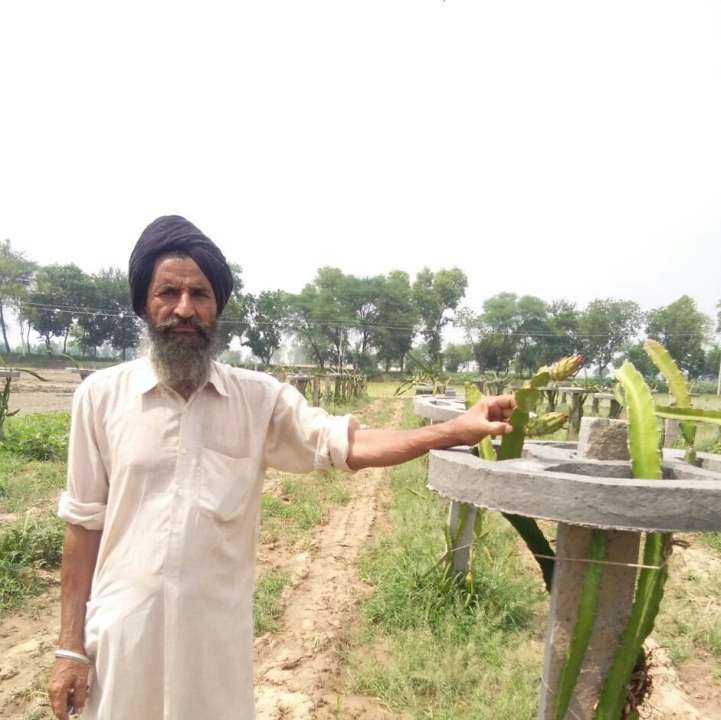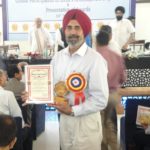
Harbant Singh
Father-Son Duo Moving Towards Organic Farming By Making Internet their Research Weapon
Farming is one of the most important ingredients of human civilization and with the advancement in technology and living, farming has also been transformed over the years. But still, many farmers in India are stuck to the conventional farming method. But one such farmer or we can say a pair of a father-son duo who made the internet as their research weapon to progress in the field of farming are Harbant Singh (father) and Satnam Singh (son).
Like other farmers, Harbant Singh was also into conventional farming until his son came up with the idea of orchard farming organically. Yes, it was Satnam Singh who after his 1 year of research, approached his father to start dragon fruit farming.
It all started just one year ago when Satnam Singh came in contact with a person (Vishal Doda) in Gujarat through one of his friends. Vishal Doda is doing dragon fruit farming in 15 acres of area. Satnam Singh researched everything about dragon fruit plant and discussed it with his father. And when Harbant Singh came to know about dragon fruit farming and its benefits, he very happily encouraged his son to start it, no matter how much investment they have to do. Soon they visited Gujarat, bought dragon fruit plants and took some guidance from Vishal Doda about its farming.
Today, this father-son duo is the first one who started dragon fruit farming in Punjab and now the plant has started bearing fruits also. They have planted 500 seedlings of dragon fruits in one and a half bigha of land. One plant gives 4-20 kg of fruit in 4 years. They especially cast and prepared a cement structure with a wheel mounted on the pillar to support this plant. Whenever they need help related to dragon fruit farming either they search the internet or they consult Vishal Doda.
Well, dragon fruit farming is not the only thing that they are doing, they have also planted Sandalwood seedling on their farm. The idea of planting sandalwood came when Satnam was watching a news channel where he came to know that a minister gifted a sandalwood tree trunk in a temple that was worth in lakhs. At that time, the thing that struck his mind was to make the future secure and more profitable in both the terms- environmentally and financially. So he invested in sandalwood farming in July 2016 and planted 200 seedlings in 6 canal area.
Both father and son are very actively involved in the farming and are well aware of the plant characteristics. They know that sandalwood is a hemiparasite plant, so they have planted split red gram seedlings, lemon plants and cauliflower along with sandalwood. They are doing diversified farming so that they can generate profit both in present and future also.
According to Harbant Singh, the farming pattern that they are following is preparing them for the future. Because both dragon fruit and sandalwood need less water (can also be irrigated through rain water only) and don’t need any special type of manure or fertilizer. Moreover, they are well aware of the fact that in the coming time paddy and wheat farming will get disappear from Punjab because of the depleting level of ground water. And orchard farming will become the need of the coming time.
Harbant Singh is strictly following organic methods for dragon farming and sandalwood farming and slowly with the time, he will reduce the chemical use in his other crops also. The thing that encouraged Harbant Singh and his son towards organic farming is the increasing diseases and ailments in the society. They want to make the environment healthy and liveable for the future generations, as their ancestors left the atmosphere for them. There is one more reason that Satnam Singh chose organic farming after completing his engineering and that is his interest in farming from the beginning.
Today Satnam Singh is making full effort in helping his father in farming with mechanized ways. They prepare jivamrit and manure at home by using cow dung and Gau Mutr (cow urine). They avoid using pesticides and fertilizers. Harbant Singh is also working on water management in his village and is teaching other villagers about it, so that, they use less tube well water. He himself has only one tube well for 12 acres of land. Other than usual crops he also has guava, banana, mango and peach tree at his farm.
Satnam especially did one year of research before starting sandalwood and dragon fruit farming because he wanted to invest in a crop that needs less irrigation and has a plethora of health and environmental benefits. He wants other farmers to do the same and adopt a farming crop that is eco-friendly and has various benefits also.
Future Plans
His future plan is to grow garlic and mahogany tree. He wants other farmers to recognize the potential and start investing in it for their better future.
Message to farmers
“Harbant Singh and his son both want other farmers to start organic farming and save the environment for the future generation, only then they can survive and make earth a better living place.”









